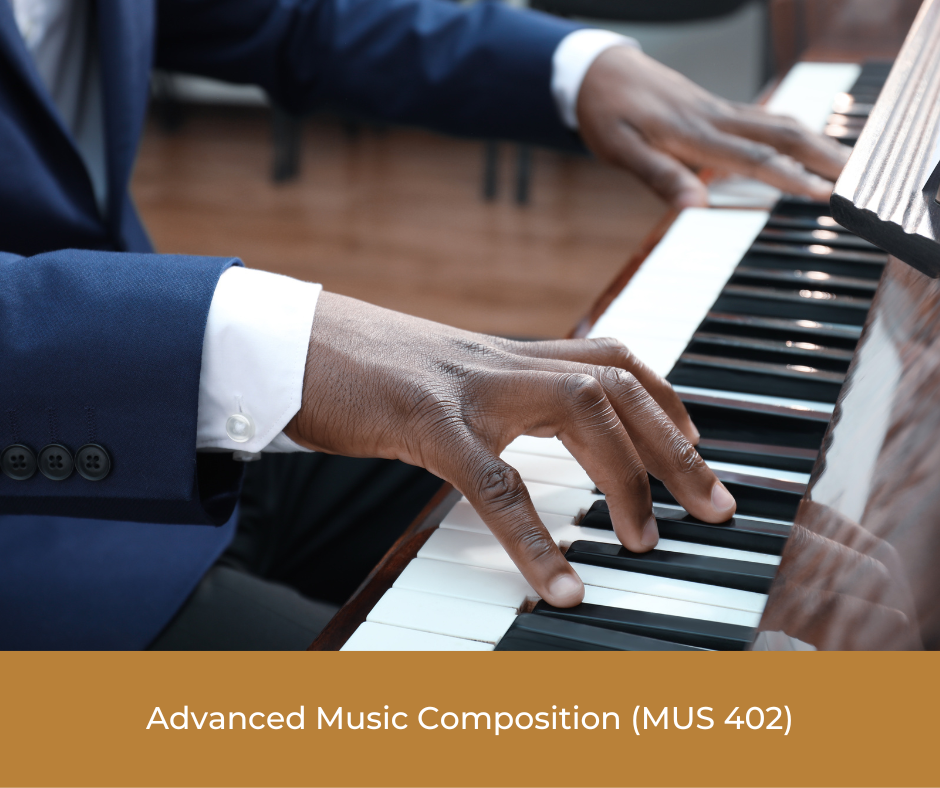Your cart is currently empty!
Advanced Music Composition (MUS 402)

Course Description – Advanced Music Composition (MUS 402):
MUS 402 is an advanced course designed to elevate students’ music composition skills beyond the basics. Building on the fundamentals of music theory, this course challenges students to explore the art of composing original works across diverse musical genres. It encourages experimentation and creative expression in the realm of musical composition. Students will have the opportunity to delve into more complex and intricate compositional techniques, fostering their growth as composers and musicians.
Outline of Major Content Areas:
- Advanced Music Theory and Harmony:
- In-depth exploration of advanced music theory concepts.
- Complex harmonic progressions and modulation techniques.
- Counterpoint and Orchestration:
- Study of counterpoint principles and techniques.
- Orchestration and instrumentation for different ensemble sizes.
- Extended Form and Structure:
- Examination of extended musical forms (e.g., sonata-allegro, rondo, theme and variations).
- Developing compositional structure and coherence.
- Contemporary Composition Techniques:
- Exploration of contemporary compositional approaches.
- Use of extended techniques and experimental elements.
- Genre Exploration:
- Composing in various musical genres, including classical, jazz, contemporary, and world music.
- Adapting compositional style to genre-specific conventions.
- Film and Multimedia Composition:
- Introduction to composing for film, television, and multimedia projects.
- Syncing music with visual media and storytelling.
- Peer and Professional Feedback:
- Workshopping and critiquing each other’s compositions.
- Guest lectures and feedback from professional composers.
- Recording and Presentation:
- Preparing compositions for performance or recording.
- Developing presentation skills for sharing original works.
Course Learning Outcomes:
Upon successful completion of MUS 402, students will demonstrate:
- Advanced Music Composition Skills: Proficiency in composing original musical works across diverse genres and styles.
- Sophisticated Music Theory Knowledge: An in-depth understanding of advanced music theory concepts and harmonic techniques.
- Counterpoint and Orchestration Expertise: The ability to apply counterpoint principles and orchestration techniques to create complex compositions.
- Extended Form and Structure Mastery: Proficiency in developing and structuring compositions in extended musical forms.
- Contemporary Composition Techniques: Competence in employing contemporary compositional approaches and experimental elements.
- Genre Adaptability: The capacity to compose effectively in various musical genres while adhering to genre-specific conventions.
- Film and Multimedia Composition Skills: The ability to compose music that enhances visual storytelling in film, television, and multimedia.
- Peer Collaboration and Feedback: The aptitude to provide and receive constructive feedback on compositions, fostering collaborative skills.
- Effective Presentation: The capability to present and share original compositions professionally.
Methods for Assessing Student Learning:
To evaluate students’ progress and understanding in MUS 402, the following assessment methods will be employed:
- Composition Projects: Students will compose original works in different musical genres, demonstrating their compositional skills.
- Music Analysis: Analytical essays or presentations assessing students’ understanding of compositional techniques in their own work and that of others.
- Orchestration and Arrangement Projects: Assignments involving orchestrating and arranging music for various ensembles.
- Peer Workshops: Collaborative workshops where students critique and provide feedback on each other’s compositions.
- Final Composition Portfolio: A comprehensive portfolio showcasing students’ best compositions and their growth throughout the course.
- Oral Presentations: Students may present and discuss their compositions and creative process with the class.
- Written Examinations: Assessments testing students’ knowledge of advanced music theory and compositional techniques.
These assessment methods will encourage students to develop their composition skills, engage in critical analysis, and refine their abilities as music composers.